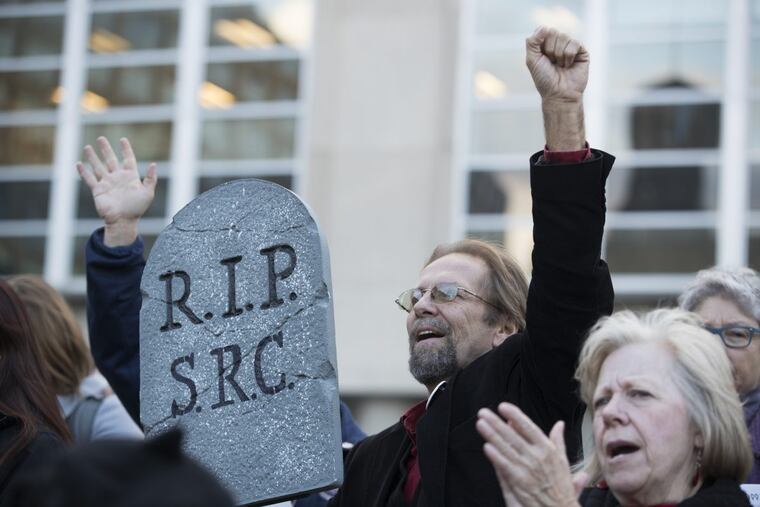Farewell, SRC: A Philadelphia school board primer
The process is underway to get a new nine-member school board in place to run the $3 billion Philadelphia School District. Here's what you need to know.

The Philadelphia School Reform Commission's days are numbered.
In November, the Philadelphia School District's governing body for the last 16 years took a historic vote to dissolve itself. (It wasn't unanimous — Commissioner Bill Green voted against dissolution, saying the time wasn't right for the SRC to go away, and Commissioner Farah Jimenez abstained.) In late December, Pedro A. Rivera, Pennsylvania's education secretary, officially certified the dissolution.
What's next? Here are some frequently asked questions and answers about the coming change in Philadelphia public school governance.
Why did the SRC blow itself up?
The SRC was created in December 2001, when the School District was officially designated "distressed" – financially and academically troubled – and a state takeover was engineered. That designation was supposed to come with more state money for the school system, and it did, for a time. That level of support eventually fell off, and when the school system fell on hard times, the city stepped up to fund the bulk of the district's shortfalls. The SRC was not meant to be permanent, and in recent years speculation had grown about whether the panel had outlived its usefulness.
Last fall, Mayor Kenney – amid a push by education activists – said it was time for the city to take responsibility for its schools. The district is projecting a deficit beginning in fiscal 2019, and with Harrisburg wary as ever of Philadelphia and its school system, the city is saying it will shoulder the bulk of the burden for those shortfalls. (Officials aren't saying the words tax increase out loud, but have said they are ruling out no options for how to come up with the millions in new money needed to plug the hole.)
In making a case to Harrisburg for dissolution, the SRC said the district was no longer in distress (coming deficit notwithstanding). Rivera agreed, and certified the dissolution just before the new year.
When will the SRC disappear?
Now that Harrisburg has given its blessing, the SRC will cease to exist on June 30. Absent a City Charter change, the School District reverts to the form of governance it had prior to the SRC – a nine-member, mayoral-appointed school board. Kenney and Council have said that they want Council to have some say over who gets appointed, but that won't happen in a formal way at first. Legislation has been introduced that would call for a charter change to give Council consent power over school board members, but that can't happen early enough for the post-SRC school board.
How will the school board be created?
Before Kenney selects his board, a 13-member nominating panel will be named. City officials said that will happen "soon," but there's no indication it is imminent. The panel will be charged with coming up with 27 names – three for each of the nine board members. The nominating panel will be made of representatives from organizations such as the chamber of commerce, institutions of higher learning, community groups, education organizations, and labor unions.
To be eligible for the school board, citizens must be registered voters who live in the city.
Officials are soliciting ideas from citizens about what they want for school board members here.
Isn't getting a brand-new school board up and running in the span of several months ambitious?
Yes. The school board will control a $3 billion budget and the fates of nearly 200,000 children, 130,000 in traditional public schools and over 60,000 in publicly funded charter schools. The SRC must adopt its first financial projection, a so-called lump sum budget (basically, just the amount it intends to spend for 2019-20) in March and a final budget in May, essentially setting the fiscal course for the new school board. District and city officials want school board members to be part of that process.
The timeline is already slightly compressed. When Kenney announced the city was taking back control of its schools, officials initially said their nominating panel would be named by December. After the nominating panel is named, board members will be selected by March. (February or March was the initial projection; February seems unlikely.) Board training will begin shortly after members are named, and the new board is expected to attend SRC action meetings beginning in March. Board committees are expected to form by early May.
Do school board members get paid?
No. School board members, like their SRC predecessors, are unpaid. (And they work long hours and sit through meetings where they are often pilloried by the public.)
Could current SRC members join the school board?
They could. The mayor has indicated he wants some continuity; expect a few members now on the SRC to join the school board. Kenney's picks for the SRC, Christopher McGinley – a Temple University education professor and former district teacher and administrator – and Joyce Wilkerson, the current SRC chair, a Temple administrator and former city official, are possibilities for seats on the new board.